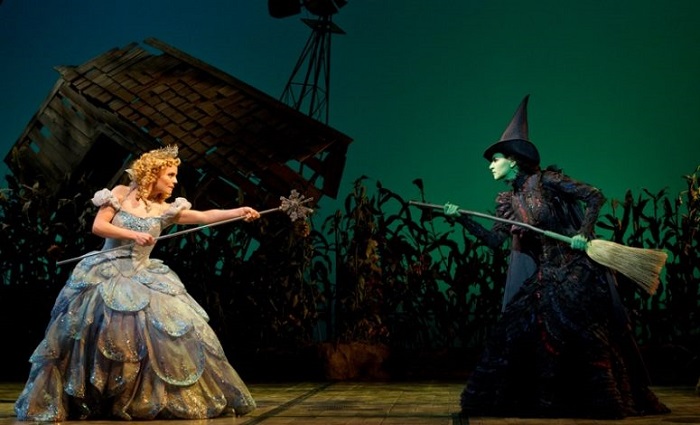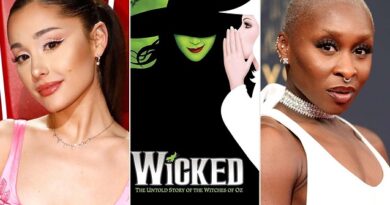No One Mourns the Wicked, But I Will Mourn If Wicked Ever Closes: Wicked Review
Before the obsession with cinematic universes and endless reboots, reimaginings were all the rage. Gregory Maguire was perhaps the king of these retellings, coming out with alternate versions of Cinderella (Confessions of an Ugly Stepsister), Snow White (Mirror, Mirror), and, of course, The Wizard of Oz (Wicked: The Life and Times of the Wicked Witch of the West). But while I always enjoyed seeing familiar tales with a new twist, I found his writing a bit slow and ponderous. Wicked, the Broadway show adaptation of Wicked: The Life and Times of the Wicked Witch of the West, is anything but.
The untold story of the witches of Oz shifts the focus of the story from just Elphaba (the Wicked Witch of the West) to include the perspective of Glinda (Glinda the Good Witch). The show starts at the end, with a celebration of the Wicked Witch’s demise. But while the joy and relief of the citizens of Oz is palpable, the opening music preceding the cheerful declarations that “the wickedest witch there ever was is dead” and “no one mourns the wicked” reveals a little melancholy, as though there is some regret that the citizens of Oz have missed. If no one mourns the wicked, and the Wicked Witch is dead, why is there an air of sadness? When Glinda the Good floats down in her bubble to join the celebration, she is asked about her relationship with Elphaba and how wickedness happens. Glinda takes this opportunity to reminisce about Elphaba’s difficult childhood, her shunning (due to her green skin), Glinda and Elphaba’s unexpected friendship, and Elphaba’s ultimate demise at the hands of Dorothy Gale.
This is the fifth time I have seen this show and yet it is no less impactful than it was the first time, nearly fifteen years ago. The show forces the audience to re-examine the very idea of good and evil, happy endings, fulfilling your dreams, and legacies. Language is an important aspect of Wicked. It uses and reuses the word “good” in different contexts to show all the different things it can mean. Phrases are repeated with a new twist (like when Elphaba swears that “some day there’ll be a celebration throughout Oz that’s all do with me” – if that’s not a lesson to be careful what you wish for, I don’t know what is). Those in authority tend to get big words just a little wrong (“rejoycify” “braverism” and a sign that reads “congratulotions” come to mind), which is played for laughs but also calls into question if we should be trusting their authority in the first place.
The power of the play really comes from the leads. They both truly grow and mature over the course of the show and those changes are conveyed expertly through their performances. When the actress who plays Elphaba opens her mouth to sing in the beginning, she comes across strong and compelling, yet clearly uncertain of herself. Everything she is feeling, from the sadness of her past (being an outcast due to the color of her skin) to the hope for the future (being beside the Wizard, as an equal to the revered ruler), is laid out clearly. She works hard to improve her life only to have her dreams shattered as she realizes that a lot of what she believed in is clever propaganda. When Elphaba and Glinda sing “Defying Gravity,” the culmination of their journey into adulthood, all their emotions are thrown at the audience. Their agony is sharp and painful, the regret in their voices clear. The background music starts off slow, reflecting their sorrow. It builds, getting louder and louder as Elphaba talks herself into a rage, practically screaming by the end. Every time I have seen the show, the audience is transfixed as her voice echoes through the theater and the music reaches a crescendo. And then, suddenly, there is silence. The lights on the stage go out as act one ends and the room is plunged into darkness and quiet, but the sound of Elphaba’s fury still echoes.
In contrast to Elphaba’s passionate voice, Glinda’s voice reflects her personality when she starts at Shiz— superficial, spoiled, and selfish. It is high pitched and nasally, sounding as stuck up as she is. As her personality develops, her voice transforms. Her early songs are less serious and sincere, but through her connection with Elphaba, she grows and matures, becoming less self-absorbed. Her voice takes on a softer quality. When Glinda duets with Elphaba in the beginning, her voices clashes with Elphaba’s; Glinda’s nasally voice not quite fitting with Elphaba’s passionate one. By the show’s conclusion, when they realize how important they were to one another, their voices blend gracefully.
ABOUT THE SHOW
Official Synopsis: So much happened before Dorothy dropped in. Wicked looks at what happened in the Land of Oz – but from a different angle. There is a young woman, born with emerald-green skin – smart, fiery, misunderstood and possessing extraordinary talent. When she meets a bubbly blonde who is exceptionally popular. Their initial rivalry turns into the unlikeliest of friendships…until the world decides to call one good and the other one wicked.
Score by Stephen Schwartz
Book by Winnie Holzman
Produced By: Universal Stage Productions in coalition with Marc Platt, Jon B. Platt and David Stone
Directed By: Joe Mantello
Opened on Broadway: June 10, 2003
Runtime: 2hrs and 45min, including 15 min intermission
Watch the trailer:
Photo: Elphaba and Glinda facing off during Wicked. Courtesy of Wicked.


